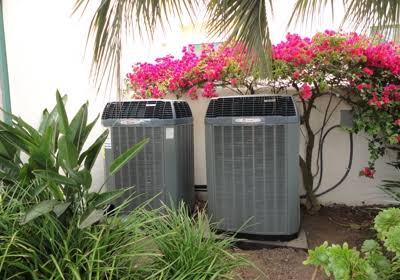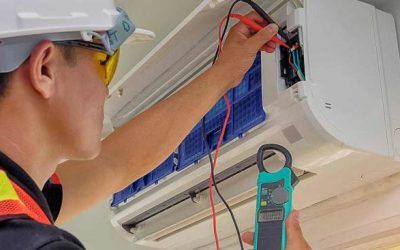There are many factors to consider when choosing a heating and cooling system for your home. The first step is determining the size of the house, which will determine how much energy it uses. It’s also important to take into account the climate where you live as well as your budget. This can help narrow down choices between options like gas, electric or solar power sources. If you have any questions about finding a system that suits your needs, be sure to contact an HVAC professional in your area!

What is the difference between heating and cooling systems?
Air conditioner is a cooling system while a heating system produces warmth and keeps room temperature stable. Both of them are used widely in today’s modern houses and apartments but their working principle differs from each other.
Air conditioning removes heat from the atmosphere by transferring it to refrigerant, which then transfers the heat by circulating the refrigerant through the heat exchanger and removing it from the room as a liquid. Cooling system absorbs heat directly from outside air making it cooler than inside air.
The main difference between heating and cooling systems is that the cooling system removes heat from space whereas the heating system adds warmth to space or just maintains its temperature at an even level.
Deep freezer is a cooling system and a refrigerator is also a system that can cool spaces but it does not have heat absorbing components. In summer, refrigerators are used to keep food cold and fresh. If the temperature in your refrigerator is too high then it will spoil all your food. Fridges should be switched off when they’re empty to prevent them from overheating.
Which system should you choose for your home?
You should select the right type of heating and cooling system for your home. If you live in a place that has extreme winter temperature then you need to install a heating system, which can keep your home warm. Keep following points in mind before deciding what system to use:
• Space size : – Portion of space that needs heat or cooling.
• Space location : – Place where space has to be chilled or heated, which may affect the type of system you need
• Climate conditions: – Weather conditions in your region and outside temperature.
• Budget : – Ability to pay for a system
When to replace an old system with a new one

When you replace an old heating and cooling system with a new one, you’ll need to make sure that the new system is compatible with your home structure. In order to do this, get an HVAC contractor to verify that the new set up will work correctly before purchasing it. If you decide to install window AC units instead of wall-mounted ones, you’ll also need to present the HVAC contractor with plans for your home. AC units are often used in places where wall-mounted cooling systems aren’t feasible because you simply won’t have room for them. This usually means that they’re installed near windows. If this is the case, ask an HVAC contractor to look at your home’s window frames, sealing and the materials used to build them. This information is necessary for the HVAC contractor to be able to give you a quote on installing AC units near windows
How do you know if your current HVAC system is too big or small?
It is important to know what size HVAC system you need for your house. It is easy to confuse BTU and SEER ratings when shopping for a new, energy efficient HVAC unit. There are a few ways that can be used to determine the right sized heating and cooling system for your home.
The first way to determine what size HVAC system you need is to calculate the total square footage of your home. To do this, measure all of the outside dimensions and multiply them by themselves (length times width). Add together all of these numbers to get a final total. Dividing this number into 250 is an estimation for how many tons your house will need for a new heating and cooling system. If the number is less than 250, you will need a slightly larger unit to compensate for heat loss. If it is greater than 250, you may be able to get away with a smaller unit (assuming that your home has super insulated walls).
If the above calculations seem too difficult or time-consuming you can always leave it up to a professional HVAC technician. A trained air conditioning contractor will be able to complete a load calculation analysis on your current home heating and cooling system. This will help the contractor determine what size unit you should replace it with in order to make sure that every room in your home is getting the optimal temperature, while saving energy throughout the process.
An HVAC technician will take into account the size of your home, insulation levels, heating and cooling load (how many windows you have in each room etc.) as well as your estimated comfort level when creating a new HVAC system for your home.
The best way to make sure that you are getting the right sized heating and cooling system for your home is to leave everything up to the professionals. A professional HVAC contractor who does regular load calculation analysis on homes will be able to make sure that you get the perfect sized heating and cooling unit.
Tips for keeping your air conditioning or heating system running smoothly
Keeping your air conditioning or heating system running smoothly helps to ensure that it’s safe to use. It also ensures that you get the best use out of your investment in the appliance, and that you’re not facing any repair costs because of a product failure. These tips will help you keep your air conditioner or heat pump working properly for a long time.
Tips for Air Conditioning Maintenance: Air conditioning systems require routine maintenance to keep them running as efficiently and effectively as possible.
• Keep indoor units clean – A dirty coil is a sign of poor air quality in your home, which can negatively affect the health of you and your family members. If the coils are dirty, you can clean them using a vacuum or compressed air that’s designed for HVAC systems.
• Clean the outdoor unit – You can get help from your local hardware store to do this. Air conditioners don’t work as well when they are dirty, and regular cleaning will result in less expensive repairs down the road. You should also be sure to use a cover for the outdoor unit when it’s not in use, as this will prevent leaves and other debris from falling into the equipment.
Tips for Heat Pump Maintenance: Heat pumps need regular maintenance in order to operate at peak efficiency and effectiveness. They have certain tasks that they should complete regularly to avoid problems down the line.
• Keep indoor and outdoor units clean – As with air conditioners, you can use a vacuum or a special type of compressed air designed for HVAC systems to keep your heat pump coils clean. The type of service that’s required will depend on how much dust is in the system.
• Change the filters – Filters are designed to keep dust and dirt from getting into the equipment and making it work less effectively. Change filters on a routine basis according to instructions provided by your manufacturer or as advised by an HVAC contractor.
• Check refrigerant levels – It’s important that the unit is not overcharged with liquid refrigerant, which can cause leaks. If a leak does occur, it can be costly and time-consuming to repair. You’ll want an HVAC contractor to check levels once a year if you’re unable to do so yourself.



